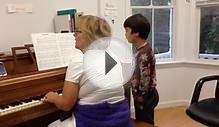
First Voice Lesson
First, there is no nerve-racking 'audition' to prepare, and no one is turned away because he or she isn't 'good enough'. (In fact, I enjoy working with beginners!) Formally auditioning for a teacher, especially when the student is brand new to singing lessons and has had no experience singing in front of others, will undoubtedly lead to unnecessary nervousness that will interfere with the student's ability to sing freely, and thus will not likely provide the teacher with a clear picture of what the student is capable of. There is no benefit, in my opinion, to having a student prepare a few songs for me to judge or critique. Hearing a student vocalize (e.g., sing scales and other simple vocal exercises) during the first few lessons will provide me with sufficient information about his or her initial abilities and let me know where the most focus will need to be placed in order to maximize what he or she has naturally.
When I first meet a student, I don't ever assume that just because he or she has had years of vocal training with other teachers, he or she has actually learned or acquired good technique. (Most of my students have come to me after they have already studied with other teachers, but were disatisfied with the results.) Nor do I assume that a singer with absolutely no formal instruction in singing in his or her background doesn't already have some good fundamental skills to further build upon. Every new student, regardless of skill level or experience, starts with a clean slate when he or she walks through my door.
This is not say that, for months on end, a singer with intermediate or advanced technical skills to start out with will be asked to sing only elementary exercises that are designed for beginners and will not be challenged. (Learning and improvement do not happen this way.) What it does mean is that I will 'test' each student's ability to skillfully execute simpler exercises, listen critically, observe carefully, diagnose any technical issues, and then decide from there what level of exercises can be performed and what specific areas of technique need to be worked on some more. Although it may seem as though the earlier lessons are not challenging enough, I am merely getting a feel for the individual's voice, and will adjust my approach and change up the exercises according to the individual student's needs and way of learning. I will always ensure that the student has mastered certain basic but fundamental skills before moving on to more advanced ones.
It is important to keep in mind, too, that many vocal exercises seem quite simple upon the first listen, but they are deceptively challenging. Nearly anyone might be able to sing the notes of a short and simple scale, for example, but producing those pitches does not necessarily mean that the singer is using good technique and a high degree of skill while singing them. Short, seemingly easy exercises are perfect to use when students are learning new coordinations and trying to make corrections to their technique or adjustments to their tone qualities because the simple, predictable patterns leave the student less distracted by the notes and more able to focus on using new and developing technique.
The student is not placed in a certain 'grade' and then asked to perform exercises appropriate only to that level. The learning process is fluid, not linear, and students may show various levels of skills in different aspects of vocal technique. Each student has an individualized (informal) 'lesson plan' that is flexible and determined by that individual's strengths and weaknesses and rate of progress, not by a pre-written systematic approach that may not apply to or fit him or her perfectly.
I do not believe that learning and improvement happen best by accident or by coincidence. In some rare cases, improvement is indeed stumbled upon. Oftentimes, though, these kinds of successes are short lived because the student has difficulties repeating the correct way of singing with consistency because he or she doesn't know what he or she did to fix the problem and create the desired sound or sensation that first time. It's a little too much like guesswork. Students and teachers must be intentional and systematic in how they approach vocal training if they hope to produce results. The teacher's role is not to simply play along on the piano and wait for the singer to 'get it' on his or her own, or for something to magically 'click' in the student's mind or body. Knowledge, explanation, intentionality and clear, direct guidance benefit the student.
For example, I do not expect a student to somehow grasp the concept of breathing and to develop good coordination (or synchronization) between the lower body and the larynx simply by vocalizing a bit, or a lot, or by gradually increasing the difficulty of the exercises or songs. Over time, this strength is increased and coordination is improved through the gradual addition and practicing of more challenging exercises, yes, but only if the mechanism is correct to start out with. Increasing difficulty alone is not going to help if the singer is not singing with correct technique. Instead, the student will tire too easily, risk injury and become discouraged, and old habits are merely being reinforced this way. (Consider what it would be like for a third grader to be asked to do the math problems of an eighth grader. He would be missing a number of steps that would have laid a solid foundation of skills to enable him to solve more complex problems. Instead, he must gradually add more skills and different methods, and increase the difficulty of his math problems over time, and systematically.) The student will not be able to successfully sing the more challenging exercises or passages if he or she doesn't first develop an understanding of how the breathing mechanism works, how it affects singing, including tone and vocal health, and then how to apply what he or she knows. He or she needs to actively develop strength and coordination - this may take some physical development and muscle strengthening - and understand and then make the physical connection between breathing and tone.
The first time that we meet, I like to sit down with new students and ask them about their singing experience and goals so that we can tailor the lessons to their individual needs and so that I can adjust my expectations accordingly. A student who wishes to sing casually, for example, will have a very different attitude and approach to his or her lessons than someone who wishes to sing professionally. Also, the lesson plan for a student who struggles to hear pitch and 'sing on tune', for example, will necessarily be different than the plan for someone who comes to me already able to begin working on more advanced skills. I am very flexible with my approach.
During subsequent lessons, I will introduce the student to some basic concepts in vocal anatomy as questions arise or whenever I feel the need to explain how certain aspects of the voice function. Knowledge of voice production and how to manipulate the vocal tract is beneficial to the student because it answers the 'what', 'why' and 'how' of voice training. The student can then be intentional in his or her practicing and achieve the desire results.
See also:
YOU MIGHT ALSO LIKE



Share this Post
Related posts
Kids Voice lessons
VOICE LESSONS FOR CHILDREN Get your child started the right way, with the best vocal technique available! Kids are going…
Read MoreSkype Voice lessons
Richard has taught voice lessons to singers and professionals in all 50 US states and over 100 countries around the world…
Read More










